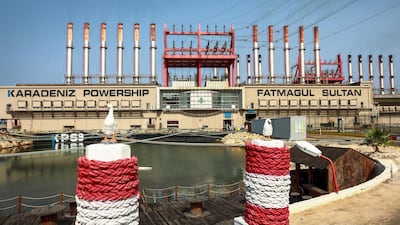The bad news from Lebanon continues to multiply: zero economic growth, a further possible downgrade in its credit rating, a sharp spike in bond yields, an escalating budget deficit, a weakening currency on the black market which threatens the dollar peg and a declared state of economic emergency. Now rumblings of war between Israel and Hezbollah is further undermining financiers’ confidence.
But Lebanon cannot recover from any of these woes unless it can remove the vampire sucking its economic lifeblood: the electricity sector.
Lebanon spends $1-1.5 billion (Dh5.5bn) annually in propping up state-owned Electricité du Liban (EDL), mostly paying for fuel oil. This has accumulated $35bn of losses since 1995, close to half of total public debt of $86bn.
Only about half the electricity supplied is paid for. As Lebanese energy expert Jessica Obeid observes, current average tariffs of 9.5 US cents per kilowatt-hour are expensive by regional standards, but still do not cover EDL’s average costs of 16 cents per kilowatt hour.
Indeed, a gloomy pall of smoke hangs over the moorings of three temporary Turkish power ships. The country’s generating capacity, even including these barges, totals only 1800 megawatts (MW). Peak power demand is 3400 MW, of which Syrian refugees are estimated to account for 400 MW.
Beirut suffers three hours of blackouts per day; other areas of the country, as much as twenty hours. The deficit is met with diesel generators that are noisy, dirty and expensive and cost private users a total $1bn annually. The “generator mafia” has become another obstacle to reform.
When one of the Turkish power ships arrived at Zahrani in southern Lebanon last August, the Amal party refused it, allegedly on environmental grounds and because they objected to receiving only a temporary solution. Their opponents charged them with protecting the interests of the generator lobby. The ship sailed first to Jiyeh south of Beirut, where the grid connection was inadequate, then to Zouk Mikael in northern Lebanon, which now enjoys almost continuous power.
The unreliable electricity supply caused the Lebanese economy indirect losses of some $10.4bn during 2009-14, according to a paper by Elie Bouri and Joseph El Assad, and around another $7bn subsequently. This translates into lower tax revenues, lost exports, unemployment and stagnant growth – components of the wider crisis.
Solving this problem should be among the easiest and most consequential fixes to Lebanon’s intractable issues. It relies on three pillars: gas, subsidy reform and renewable energy.
Energy and water minister Nada Boustani, with ten years previous experience in the ministry, is an ally of her forerunner in the role, now Free Patriotic Movement party leader and foreign minister Gebran Bassil. Her success - or failure - could be important for his presidential ambitions in 2022.
Ms Boustani has laid out a plan of installing temporary power plants, retiring old and inefficient facilities, while boosting permanent gas-fired generation by 3120 MW.
These plants will be fuelled by liquefied natural gas (LNG) imports, far cheaper and cleaner than fuel oil. Sectarian politics and lack of pipeline connections mean that, instead of having one floating import terminal for the country’s small market, Lebanon will have three, at Selaata between Tripoli and Byblos, Deir Ammar in the north, and Zahrani in the south, each linked to its own power station.
In the longer term, Lebanon could hope for its own offshore gas. A consortium of France’s Total, Italy’s Eni – which has recently enjoyed great success nearby off Egypt and Cyprus – and Russia’s Novatek will drill one well this December and another next December. But production will take several years, even if commercial volumes are found. Cyprus’s struggles to develop the Aphrodite field it found in 2011 show that it is hard to make deepwater gas projects for small end-markets economically viable. Meanwhile, if conditions in Syria improve, Lebanon could resume imports of Egyptian gas via the Arab Gas pipeline through Jordan.
The ministry has not yet announced new tariffs, but it is considering a hefty raise of about 5 cents per kilowatt-hour, while protecting low-income consumers. Still, actually collecting electricity bills is hard while the state’s authority is so weak in some areas. Improved service will likely have to come first.
Unlike nearby Jordan and Egypt, Lebanon has made little progress with renewable energy. A high population density, hilly terrain and the government’s shaky ability to guarantee payment make it hard to replicate the ultra-low costs achieved for solar power in the Arabian Gulf.
But the ministry’s plan includes several fairly small solar and wind plants scattered around the country, and last year it signed for three wind farms in Akkar, near Tripoli. Small-scale rooftop solar systems are gradually taking off, often coupled with batteries to avoid reliance on the grid or diesel generators overnight. For consumers who cannot evade the increased EDL bills, installing solar will become attractive.
The ministry’s plan itself is reasonable. But it faces the usual barriers of corruption and patronage. Some fear that the tender process for the new plants will not face proper scrutiny by parliament or a (so far non-existent) independent regulator. This would leave room for political parties to rig the ministry’s tenders in favour of their preferred candidates. As with the Zahrani power ship saga, local interests can block new generating plants, LNG terminals, pipelines and electricity lines.
What remains to be seen is whether the electricity vampire draining Lebanon’s finances can be slain, before the country runs out of money and time.
Robin M. Mills is CEO of Qamar Energy, and author of The Myth of the Oil Crisis


